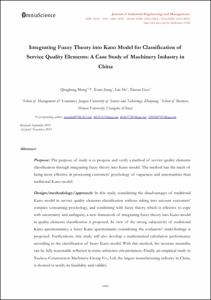Mostra el registre d'ítem simple
Integrating fuzzy theory into Kano model for classification of service quality elements: a case study of machinery industry in China
| dc.contributor.author | Meng, Qingliang |
| dc.contributor.author | Jiang, Xuan |
| dc.contributor.author | He, Lin |
| dc.contributor.author | Xinxin, Guo |
| dc.date.accessioned | 2016-03-30T17:19:13Z |
| dc.date.available | 2016-03-30T17:19:13Z |
| dc.date.issued | 2015-12 |
| dc.identifier.citation | Meng, Qingliang [et al.]. Integrating fuzzy theory into Kano model for classification of service quality elements: a case study of machinery industry in China. "Journal of Industrial Engineering and Management", Desembre 2015, vol. 8, núm. 5, p. 1661-1675. |
| dc.identifier.issn | 2013-0953 |
| dc.identifier.uri | http://hdl.handle.net/2117/84915 |
| dc.description.abstract | Purpose: The purpose of study is to propose and verify a method of service quality elements classification through integrating fuzzy theory into Kano model. The method has the merit of being more effective in processing customers’ psychology of vagueness and uncertainties than traditional Kano model. Design/methodology/approach: In this study, considering the disadvantages of traditional Kano model in service quality elements classification without taking into account customers’ complex consuming psychology, and combining with fuzzy theory which is effective to cope with uncertainty and ambiguity, a new framework of integrating fuzzy theory into Kano model in quality elements classification is proposed. In view of the strong subjectivity of traditional Kano questionnaires, a fuzzy Kano questionnaire considering the evaluators’ multi-feelings is proposed. Furthermore, this study will also develop a mathematical calculation performance according to the classification of fuzzy Kano model. With this method, the accurate mentality can be fully reasonable reflected in some unknown circumstances. Finally, an empirical study in Xuzhou Construction Machinery Group Co., Ltd, the largest manufacturing industry in China, is showed to testify its feasibility and validity. Findings: The calculation results and the application effect show that the proposed model has good performance in classifying customer requirements. With this method, the accurate mentality can be fully reasonable reflected in unknown circumstances and it is more objective than traditional Kano model to classify the service quality elements. Originality/value: This study provides a method to integrate fuzzy theory and Kano model, and develops a framework to classify service quality elements. |
| dc.format.extent | 15 p. |
| dc.language.iso | eng |
| dc.publisher | OmniaScience |
| dc.rights | Attribution-NonCommercial 3.0 Unported |
| dc.rights.uri | http://creativecommons.org/licenses/by-nc/3.0/ |
| dc.subject | Àrees temàtiques de la UPC::Economia i organització d'empreses::Gestió de la qualitat |
| dc.subject.lcsh | Fuzzy theorie |
| dc.subject.lcsh | Customer services--Quality control |
| dc.subject.lcsh | Consumer satisfaction |
| dc.subject.other | Kano model |
| dc.subject.other | Service quality elements classification |
| dc.subject.other | Fuzzy theory |
| dc.title | Integrating fuzzy theory into Kano model for classification of service quality elements: a case study of machinery industry in China |
| dc.type | Article |
| dc.subject.lemac | Lògica difusa |
| dc.subject.lemac | Serveis d'atenció al client -- Control de qualitat |
| dc.subject.lemac | Satisfacció del consumidor |
| dc.identifier.dl | B-28744-2008 |
| dc.description.peerreviewed | Peer Reviewed |
| dc.rights.access | Open Access |
| local.citation.publicationName | Journal of Industrial Engineering and Management |
| local.citation.volume | 8 |
| local.citation.number | 5 |
| local.citation.startingPage | 1661 |
| local.citation.endingPage | 1675 |
Fitxers d'aquest items
Aquest ítem apareix a les col·leccions següents
-
2015, vol. 8, núm. 5 [23]


